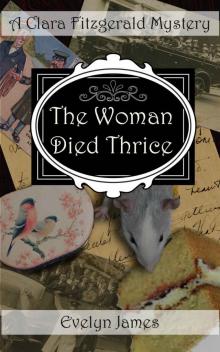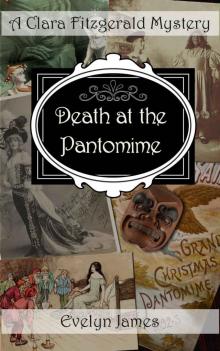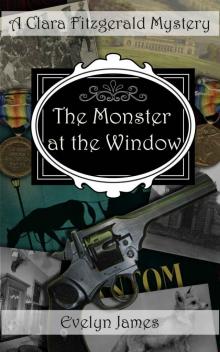- Home
- Evelyn James
Mr Lynch's Prophecy Page 6
Mr Lynch's Prophecy Read online
Page 6
“Right, we have a lot to do,” Clara said. “And no time like the present. I want to see the place this all happened for myself. Do you two want to come?”
O’Harris and Tommy were quick to agree. With promises to Annie that they would be back for dinner, they set out to find the crime scene. O’Harris had been told by the police roughly where the incident took place and they could work out the rest by following Peterson’s route back from the picture house. There were only a couple of places where he could have slipped into the back streets of Brighton from the main road and once within them, there was only a handful of ways to go. As it happened, they came across the spot where Peterson had fallen, first.
The rough bricks of the alley were stained a deep, brassy red where Peterson had lay bleeding. There was a further dark smear against the wall, seemingly caused as he dragged himself along. The trio stopped by the spot and stared at it.
“Who found him?” Clara asked O’Harris.
“The Inspector did not tell me the man’s name. He is one of the residents of the houses here,” the captain answered.
“Let’s follow Peterson’s trail,” Clara said.
It was not hard to retrace the desperate escape of the wounded man. His injuries had meant he had not been able to go very far before he fell. He had been travelling along a straight alley with a brick wall along one side. On the other, several side alleys led to the backyards of various houses. Peterson had not veered from his route; the occasional red handprint, or smear of blood marked his progress and there were drops of blood on the ground. Clara took note of it all as they walked.
They came to a point just a few hundred feet from where Peterson had fallen, where the blood trail veered from the straight route it had so far taken and disappeared down a side alley. Here, at the corner of the intersection, was a lot more blood. A large dark brown patch spread across the ground, the stain dried and soaked deep into the stone and dirt of the alley. There was a further stain on the wall and splatters of blood had sprayed across a wider area. There was no doubting this was the scene of the crime.
Clara took a good look down the alley, at the back gates of at least a dozen houses, split between the two sides of the narrow pathway. How many people lived in those houses? This was a poorer area of Brighton and it was unlikely that a single family occupied each house. It was far more common for three or more families to rent the properties, occupying a single floor each. The poorest may even rent just a room or two, or share a floor with others in an equally struggling position. What this all meant to Clara was lots of eyes and ears to hear and see a commotion in this back alley. Yet, as far as she was aware, no one had come forward to say they had seen the attack.
“The police found the woman?” Clara asked O’Harris.
“That’s what the Inspector said.”
Clara pulled a face. Such an attack did not happen in silence. The police were working on the theory that the female victim had stabbed Peterson in her dying moments. You would think people would have come out to see what was happening, unless they knew better than to do so, and that raised a whole new array of questions.
“There is something wrong about all this,” Clara said.
She took a few paces down the alley and glanced about at the houses. It was only late afternoon and she could hear children playing in the distance and people in the yards working, but no one had stepped outside to see what was going on, or why three people were inspecting the spot where a murder had been committed. There was always usually someone in a neighbourhood who was curious enough to take an interest. Clara had the feeling that curiosity was not a wise thing in this area of Brighton.
She came to a gate where she could hear someone sweeping in the yard behind and she knocked to get their attention.
“Hello? Excuse me?”
The sweeping stopped. There was a long pause, as if the person in the yard had frozen, and then the gate was tentatively opened. A young female face appeared in the narrow gap between gatepost and gate. The woman looked anxious as she peered out, Clara would go as far as to say she appeared terrified.
“Hello,” Clara said with a friendly smile. “My friend was injured just down the alley last night and I am trying to find out what happened. I wondered if…”
The woman slammed the gate in Clara’s face as fast as she could and then scuttled back to the house, her footsteps ringing on the hard ground of the yard. Clara frowned.
“What’s the matter?” O’Harris called over.
Clara walked back towards him and her brother, mulling over the problem.
“She was scared,” she said. “Too scared to talk to me. There is something happening here that clearly has people worried, and I dare say is connected to the death of this woman.”
Clara observed the houses again, looking for signs that anyone was paying attention to what they were doing. Where were all the nosy neighbours? Where were the idle gossips and curtain-twitchers? For that matter, where were the people casually using the alley to go about their business? There should be people wandering around, cutting through from other parts of Brighton or heading for home. She had never seen an alley so deserted.
“I don’t like this at all,” Clara repeated herself. “I am even more convinced that Peterson is not responsible for this crime. I think he stumbled on something and got himself stabbed in the process.”
“If only he could remember,” O’Harris groaned, frustration coming into his tone.
“We shall have to do the remembering for him,” Clara replied. “Come on, I have seen enough. I would like to talk to the man who helped Peterson, if we can find him.”
They headed back the way they had come. Clara took note of all the blood stains again, working out Peterson’s fraught journey. He had bumped into the alley wall here; fallen there. Here was the point where he could no longer walk and had to drag himself. It must have seemed an eternity to Peterson, but the entire ordeal probably only lasted minutes before he was found.
At the spot where he finally fell, Clara knelt down and tried to picture what it had been like. Tried to put herself in Peterson’s place. No wonder he was so deeply traumatised by it all that he erased most of the episode from his mind. Clara could not truly imagine the pain and terror that had engulfed Peterson in that instant. He must have thought he would die. It was just horrible to consider. Clara had dropped her head and partially closed her eyes to get her mind around the scenario, when someone spoke.
“Who are you?”
Clara pulled herself from her thoughts at the sound of the voice. She looked up and saw a man stood in the gateway of the yard to her right. He looked angry rather than frightened, which gave her hope.
“We are friends of the man who was attacked last night and fell here,” Clara explained to the man. “We want to know what happened to him.”
The man folded his arms across his chest.
“Then you will be wanting to speak to me,” he said sternly. “I’m the one that found him.”
Chapter Eight
At first the man was reluctant to let them into his yard, let alone through to his house. He blocked the gate with the look of someone who won’t be moved for anything.
“My name is Clara Fitzgerald,” Clara hoped a polite introduction might ease the tension. “These gentlemen are my brother Tommy and Captain O’Harris.”
The man turned his fierce gaze on each of them in turn. He was aged somewhere in his forties, possibly early fifties, and wore the dull, but tidy clothes of a labourer. His waistcoat had been patched a few times and had one button that was odd to the others. However, all his clothes were very clean and there was a pride to his appearance that suggested a man with standards.
His hair was rapidly running to grey, and he had a very square face and a firm jaw. He bore himself confidently, unlike so many who skittered about the alleys and called these houses home. Clara could see why he would be a man to go to the aid of someone else.
“The gentleman you found
injured in this alley, his name is Private Peterson, and he does not remember anything that happened. We want to try and find out who hurt him,” Clara added.
“The police came here and searched the alley,” the man responded, his tone cold. “They found a woman dead, stabbed. They didn’t say it, but I got the feeling they thought your friend killed her.”
“We don’t believe that,” O’Harris added hastily. “Peterson is not a violent man and he had no reason to hurt the woman.”
The man in the yard frowned, clearly trying to decide what he believed about the situation and what he did not. Finally, he gave a nod.
“I’ll talk to you for a bit, but I don’t know much. I never saw anything.”
“Thank you, your help will be much appreciated,” Clara said with relief. “What is your name?”
“Just call me Robert,” the man replied. “We ought to talk inside.”
Robert led them through the yard, which was typical of the yards of working-class homes. It was paved over and contained the dustbins for the house and a tin bath hanging on a wall. A clothes line ran from the back of the house to the corner of the wall that skirted the yard. Nearer the house there was a long low outhouse, which Clara assumed contained a toilet and probably the coal store. Robert led them past this and through a green door that led into a narrow corridor. On their left was a dark staircase leading up, on their right a kitchen offered a glimmer of somewhere more cosy and pleasant. Clara had been struck by how this whole area seemed to exist in shades of brown and grey, a splash of colour, even just some flowers or green grass, would not go amiss to brighten things up. Clara felt that living in this area for too long could have a very depressing effect on a person.
Robert motioned for them to step into the kitchen. There were two women within the small space, which was dominated by a compact range oven and a welsh dresser that must have had to come through the kitchen door in pieces, considering the size of it. The women were stood either side of a wooden table making pastry. They had been talking and were startled at the sight of visitors.
“This is my wife and my mother,” Robert introduced the women quickly. “These people are friends of the fellow I helped last night and want to know what happened to him.”
The older woman, who must have been in her seventies, had pure white hair scraped back into a bun, and scowled as this information was imparted.
“I told you not to go out there,” the woman snapped at Robert.
“Yes, you did, and I said I can’t leave a fellow to bleed to death,” Robert responded in a flat tone that suggested he had had this argument several times already and was really not bothered in continuing it.
“I don’t know what you hope to discover,” the old woman turned her gaze on Clara, “but you would be best off forgetting about it all.”
“Why is that?” Clara asked her.
“Because no good comes of interfering with these things,” the old woman puttered. “People who get themselves into trouble have to sort things out for themselves.”
“If you let me talk to these folks in peace, they’ll be gone before you know it,” Robert said to his mother.
“And what about dinner? Who is going to sort this pastry?” His mother barked at him.
“It will only be for a few moments,” Robert stood his ground. “I don’t know much, anyway.”
The old woman cast another sharp look at Clara.
“It’s a bad business, made worse by people poking their noses into it. But if you won’t be told…” with her head held high, as if she knew best and would be proven right in the end, the old woman stalked out of the kitchen.
Robert’s wife had been silent during the argument, but Clara had seen the intense way she had studied them all and sensed her quietness was far from being due to a lack of confidence. She just had nothing to add to the debate. She held Robert’s gaze for as long as it took to leave the kitchen and follow his mother. There was a message in that look, one that Clara suspected meant Robert should be careful what he said.
Robert lit a lamp on the dresser. There was a gas light hanging from the kitchen ceiling, but it was not yet dark enough to warrant turning it on. The old lamp, with its cheap paraffin oil, sufficed to take the edge off the dull shadows of the room. Robert moved the lamp to the table and rested his hands on the wooden surface, just avoiding the flour being used in the pastry making.
“You’ll have to excuse my mother, she is worried,” he said.
“I get the impression that is quite a common thing around here,” Clara replied.
“You noticed that?” Robert tilted his head.
“Most places you go where something like this has occurred, people are only too keen to peer out their windows and stand on their doorsteps taking a look. They all have an opinion on what happened,” Clara said. “In contrast, I sensed that everyone here was very keen to keep out of sight. I have to wonder why that is.”
Robert shrugged.
“We are quiet folk, minding our own business,” he said.
Clara knew there was much more than he was saying but badgering him was unlikely to get information. The reaction of his mother to their presence, told her that something was amiss in the neighbourhood and people were anxious and scared to talk.
“How did you come to find Peterson?” Clara asked him instead.
Robert repeated his shrug.
“I heard someone calling for help. I was in the yard, cleaning my work boots, when I heard this man calling out. He sounded awful, so I went to the gate to take a look and he was lying on the ground, trying to drag himself along.”
O’Harris cringed at this information. Robert noticed his expression.
“It did seem bad,” he agreed. “I hurried out and saw that the man had a knife in his back. My wife had been in the kitchen and saw me leave the yard through the window. She followed me and I told her to go fetch a doctor. There is one a few streets away. He came and instantly said we had to summon an ambulance.”
“Did other people come out to assist you?” Clara wondered.
“Not at first, then when people realised I was out there, and the doctor appeared, they started to take a look. We didn’t know about the woman, of course,” Robert was solemn. “My wife managed to find a police constable while she was fetching the doctor and sent him this way. He said he would have to call for more help considering the nature of the incident. Before we knew it, there were a lot of people in the alley.”
“And the police searched the area?” Clara asked.
Robert nodded.
“They followed the blood trail backwards. I watched them at first, but I had things to do. I was back cleaning my boots when I heard someone shouting. I guess that was when they found the woman.”
“Do you know who she was?” Clara asked.
Robert shook his head quickly. Clara noted that he did not meet her eyes, and she suspected he was lying.
“Did no one see what happened?” She persisted.
“I guess not,” Robert answered.
“Seems to me, everyone keeps very much to themselves around here,” Tommy mentioned casually. “Usually the alleys behind houses are busy places. People cutting through them, friends talking across them as they work in opposite yards, children playing. Seems strange that no one was around to see anything.”
“That’s just how it was,” Robert replied, still not meeting anyone’s eyes. “I really don’t know anymore than that and I am sorry for your friend. Will he be all right?”
“Depends on whether the police continue to consider him a murderer or not,” O’Harris said darkly.
“Has anything happened like this before, in the area?” Clara tried another approach.
“What do you mean?” Robert shuffled his feet, it might have been an unconscious movement, but Clara sensed he was uneasy at her question.
“I mean, have there been stabbings in the area before? Is it something people worry about?”
“People worry about a lot
of things,” Robert avoided her question. “You never really know who is about. People prefer to be indoors and safe in their beds at night.”
“You mean this is not a place people should be wandering about after dark?” Clara pressed him.
“I didn’t say that, I mean, things can happen anywhere, can’t they?” Robert was becoming agitated. “Look, I really have told you everything I can.”
“And that is much appreciated,” Clara let the matter go, she knew when she was only going to push a person into aggressive silence. Robert didn’t want to say anything more right there and then, but that did not mean he would not talk later, when things had calmed down.
“Yes, and I really appreciate what you did for Peterson,” O’Harris quickly jumped in. “He has been through so much and didn’t deserve to be attacked, at all. He really is a gentle soul.”
“Did you say he was a soldier?” Robert asked tentatively.
“He was a private in the last war,” O’Harris explained. “He went through some rough times, but then, didn’t we all?”
“I was in the war,” Robert said. “Those were dark times. You expect to come home and everything to be… different.”
“Only, the war comes back with you,” Tommy finished for him.
Robert pursed his lips together.
“When I heard him calling, your friend, it made me think of those times in the trenches when you would hear a comrade calling out for help. It makes your stomach go over. Back then, so often we were not allowed to leave the trenches to help a mate, the officers wouldn’t allow it. And then, when you were allowed, so often you found your mate dead and you asked yourself, what if I had been a moment sooner? Just a moment or two?” Robert sagged his head. “You don’t forget things like that. It’s a part of the reason why, when I heard that voice, I couldn’t sit by and ignore it.”
“Your mother would have preferred that you did,” Clara read between the lines.
“My mother worries a lot,” Robert said. “I tell her that we can’t live our lives in fear, not if it means leaving others to suffer. He had lost a lot of blood, your friend. I’m amazed how far he dragged himself. Sheer determination, that was.”

 The Woman Died Thrice
The Woman Died Thrice The Poison Pen
The Poison Pen The Fossil Murder
The Fossil Murder The Green Jade Dragon
The Green Jade Dragon Murder on the Mary Jane
Murder on the Mary Jane Murder and Mascara
Murder and Mascara Mr Lynch's Prophecy
Mr Lynch's Prophecy The Traitor's Bones
The Traitor's Bones The Valentine Murder
The Valentine Murder Death at the Pantomime
Death at the Pantomime The Cowboy's Crime
The Cowboy's Crime The Trouble With Tortoises
The Trouble With Tortoises The Monster at the Window
The Monster at the Window